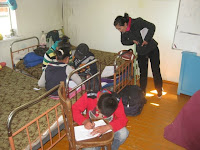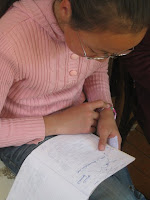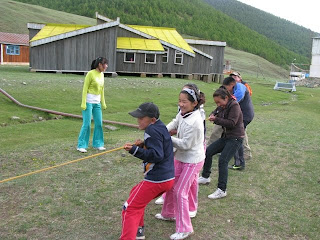 After some administrative problems including being told we would have three quarters as many, then twice as many students as we'd planned, we had a good 5 days in the countryside at Uvgun Jargalant, "Ol' Blissful," a summer camp for children nearly 70 kilometers from Bayankhongor.
After some administrative problems including being told we would have three quarters as many, then twice as many students as we'd planned, we had a good 5 days in the countryside at Uvgun Jargalant, "Ol' Blissful," a summer camp for children nearly 70 kilometers from Bayankhongor.
(Thanks to Peder for this photo). For more photos from the camp week, click here.
Our particular camp focused on English and life skills, and there was some physics rolled up in there too. As you might imagine, the planning and compromises that went into making the camp were many, including a surprise early morning flight back from UB for Leslie because two of the English teachers and the life skills teacher dropped out two days before we were supposed to leave. We nearly canceled the thing altogether because of the many frustrations and misleading, fanciful assertions made by some of the Mongolian staff, but like many kids who are forced to go to camp and then end up loving it, we found ourselves sorry to see the camp end.
The first two days were treacherously cold and it snowed on and off, sometimes for over an hour. We were advised to bring clothes as if it were winter, and we did a pretty good job layering. Unfortunately, we didn't quite take them as seriously as we should have because as it was snowing through the broken window of our room and we were hunkered down in our sleeping bags, our faces were ice, ice cold. We never thought it would snow in June, and in fact, the other two Peace Corps volunteers who went with us (Peder and Fahd) were so convinced it wouldn't be that cold that they didn't even bring sleeping bags. Brrrr.


Peder & Fahd took some of the kids on a day hike up a smaller peak on one of the surrounding mountains. Notice the storm clouds with snow rolling in.
Our Daily Schedule at Uvgun Jargalant Camp
| 9-10 | Breakfast |
| 10-11 | English lessons in 3 groups by level |
| 11-11:30 | Tea, butter crackers |
| 11:30-12:30 | Life Skills (1/2 hr), Physics (1/2 hr) |
| 1-2 | Lunch |
| 2-3 | Free time |
| 3-4 | English (language games) |
| 4-4:15 | Tea or yogurt |
| 4:15-7 | Structured play time (hiking, football, sports tournament, scavenger hunt) |
| 7-8 | Dinner |
| 8-11 | Event (drag show, dancing, plays, poetry-off) |
The first day we arrived at camp in the afternoon, so after a quick break for some soup and the first of many yak milk teas (not even as good as you might think), we interviewed each of the 10-17 year olds and grouped them according skill level resulting in some of the older kids winding up with the youngest kids. No matter, though. All the students were motivated and energized for each lesson, and we didn't have a single discipline or attention span problem.



Students used their bunks as desks and chairs. Much of the teaching was active and involved speaking or drawing, so they got along just fine.
The classroom was useful, but we were outside a lot. In fact, many of the highlights of the week for us included:
1. Nathan's hike up a steep mountain with 4 kids.


The five hiking guys stop for a quick photo.
 [Left] The grounds of the camp. [Right] The kids found wild onions and a kind of sour wild leaf vegetable they called red cabbage. It was like grocery shopping on the mountain.
[Left] The grounds of the camp. [Right] The kids found wild onions and a kind of sour wild leaf vegetable they called red cabbage. It was like grocery shopping on the mountain.






Early on we taught the campers some sports words and phrases.
Here you can hear them shouting, "Pass it to me!" and, "Throw it to me!"
They had the throwing part down, but receiving never did catch on.
3. And teaching music outdoors.
One evening, Leslie and I turned in early while Peder and Fahd attended the camp drag show. We heard they were going to have a "Miss" competition, but didn't know it would be the boys dressing up as girls. Some of them really committed and pulled it off. The one older student dressed his version of Middle Eastern garb won the competition. Maybe less IS more.


Another day was filled with a Mongolian sports tournament that pitted us against each other in a tug of war. We broke the rope with our awesomeness leaving the competition in a draw.


And at the end of the evening, Leslie put on her dancing shoes to teach the Cha Cha Slide. Think of it as a kind of hip-hop line dance, where the recorded announcer instructs dancers when and what to do, like a solo square dance. It was a big hit.
On the final evening they put on English language skits of Little Red Riding Hood and Goldilocks and the Three Bears (which they knew through Russian influence), and The Boy Who Cried Wolf was new, but a big hit. In the two latter skits, they came up with original dialogue and memorized it in between readings from the narrator. We were impressed.
What Nathan thought was most stunning from the week was how well Leslie was able to really instill some positive qualities through life skills training. Most notably, she taught them about sportsmanship, being a role model, and positive language. After the second day, the motto of the camp was "We Can Do It!" in English. This flavored everything we did from then on as kids happily shouted the moniker to their friends while hiking, working in class, and competing on the field of play.
It was a good week filled with more than we can put on one blog, so check out more of the action here. We look forward to doing the camp again next year working from the strengths and weakness of this year.



No comments:
Post a Comment